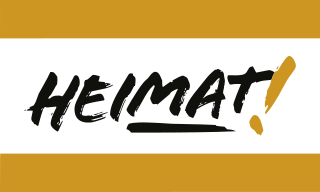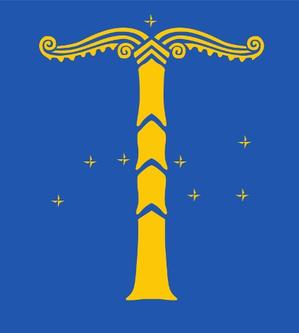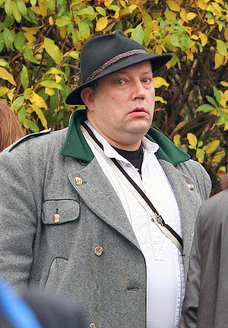
The Homeland, previously known as the National Democratic Party of Germany, is a far-right neo-Nazi and ultranationalist political party in Germany.

The Artgemeinschaft Germanic Faith Community was a German Neopagan and neo-Nazi organization founded in 1951 by Wilhelm Kusserow, a former member of the SS. In 1983, it merged with the Nordungen. From 1989 to 2009, it was headed by Jürgen Rieger. In September 2023, the Federal Ministry of the Interior banned the Association.

Michael Kühnen was a leader in the German neo-Nazi movement. He was one of the first post-World War II Germans to openly embrace Nazism and call for the formation of a Fourth Reich. He enacted a policy of setting up several differently named groups in an effort to confuse German authorities, who were attempting to shut down neo-Nazi groups. Kühnen's homosexuality was made public in 1986, and he died of HIV-related complications in 1991.

Christian Worch is a prominent German neo-Nazi activist and chairman of the far-right political party Die Rechte.

The Action Front of National Socialists/National Activists was a West German neo-Nazi organization founded in 1977 by Michael Kühnen under the name "Action Front of National Socialists" (ANS). It was based around a group of young neo-Nazis in Hamburg. Upon founding the group Kühnen declared "we are a revolutionary party dedicated to restoring the values of the Third Reich" and adopted a version of the Nazi flag in which the swastika was reversed, with the spaces black and the actual cross blending into the background, as their organization's emblem. He sought to link his movement with other groups, by seeking links with Waffen-SS veterans organisations, sending a delegation to the Order of Flemish Militants-organised international neo-Nazi rallies in Diksmuide and working closely with the Wiking-Jugend.

The Roter Frontkämpferbund, usually called the Rotfrontkämpferbund (RFB), was a far-left paramilitary organization affiliated with the Communist Party of Germany (KPD) during the Weimar Republic. A legally registered association, The RFB was banned in 1929 after violent clashes during May Day demonstrations in Berlin, but continued its work illegally.

The Nationalist Front was a minor German neo-Nazi group active during the 1980s.

Friedhelm Busse was a German neo-Nazi politician and activist. In a career taking in some six decades Busse established himself as a leading voice of German neo-Nazism.
Die Stille Hilfe für Kriegsgefangene und Internierte, abbreviated Stille Hilfe, is a relief organization for arrested, condemned and fugitive SS members, similar to the veterans' association HIAG, set up by Helene Elisabeth Princess von Isenburg (1900–1974) in 1951. The organization has come under criticism for its encouragement and support of neo-Nazis. It has also garnered a reputation for being shrouded in secrecy and thus remains a source of speculation.
The German Alternative was a minor neo-nazi group set up in Germany by Michael Kühnen in 1989.
The National Offensive was a German neo-Nazi party, which existed from 3 July 1990 to 22 December 1992.

The far-right in Germany slowly reorganised itself after the fall of Nazi Germany and the dissolution of the Nazi Party in 1945. Denazification was carried out in Germany from 1945 to 1949 by the Allied forces of World War II, with an attempt of eliminating Nazism from the country. However, various far-right parties emerged in the post-war period, with varying success. Most parties only lasted a few years before either dissolving or being banned, and explicitly far-right parties have never gained seats in the Bundestag post-WWII.
Bela Ewald Althans is a German former neo-Nazi. Once the leading organiser in Germany's neo-Nazi underground, Althans left the movement following his imprisonment in the 1990s, and is no longer involved in politics.

Gottfried Küssel is an Austrian far-right political activist who also gained some notoriety in Germany. He has been a leading figure in neo-Nazism and Holocaust denial since the 1970s.

The III. Path or The Third Path is a far-right and neo-Nazi political party in Germany.

Querfront is a German term originating in Weimar politics and referring to the cooperation between the far-right and far-left, or nationalist and socialist ideologies, as well as the combination of their positions. It is primarily understood as a strategy to unite forces in an effort to gain power. The term was first, and most prominently, used in the Weimar Republic, where it referred to the cooperation between conservative revolutionaries and the far-left.

Germany–Palestine are relations between the Federal Republic of Germany and the State of Palestine. Germany does not recognize Palestine diplomatically. However, Germany has a Representation Office in Ramallah, while there is also a Palestinian Mission in Berlin. There are numerous contacts between both societies, and Germany provides economic support to the Palestinian Territories through development partnerships. Germany is diplomatically committed to a two-state solution and has acted as a mediator in the Arab–Israeli conflict in the past.

The Workers' Party of Germany was a minor political party in Germany. It saw its mission in overcoming the left-right political divide via the Querfront strategy.

Michael Koth is a German National Bolshevik, supporter of North Korea and the Juche ideology, as well as advocate for the Querfront political strategy.















